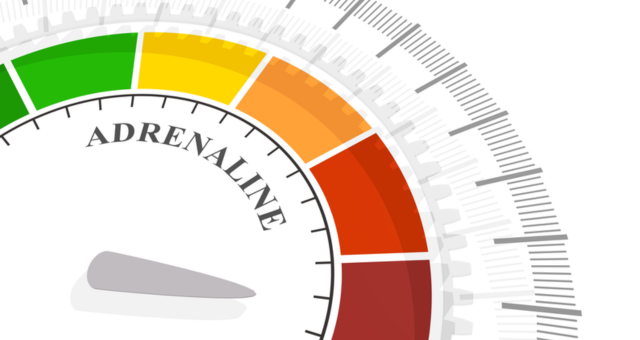Medically Reviewed by Lucas Rosa, PhD in Molecular Biology

Understanding Adrenaline
Epinephrine, commonly known as adrenaline, is a vital hormone that fuels the body’s fight-or-flight reaction. This powerful chemical is produced by the adrenal glands and prepares your body to respond to stress, danger, or high-energy demands.
However, when adrenaline levels become too high or too low, it can lead to a variety of health problems, including chronic fatigue, anxiety, high blood pressure, and metabolic issues.
Balancing adrenaline is essential for sustained energy, mental clarity, and long-term well-being. Let’s explore how adrenaline works, what happens when it’s out of balance, and how you can regulate it naturally.
What Does Adrenaline Do?
Adrenaline is a part of a group of hormones and neurotransmitters that are generated by the adrenal medulla, the core of the adrenal glands. It works by binding to receptors in various organs, triggering rapid physiological changes that help the body respond to immediate challenges. (1)
Key Functions of Adrenaline
- Increases Heart Rate & Blood Pressure: Ensures more oxygen and nutrients are delivered to muscles and the brain.
- Boosts Energy Availability: Triggers the liver to convert glycogen into glucose, rapidly supplying the body with a burst of energy.
- Enhances Focus & Alertness: Sharpens cognitive function by activating the brain’s response to stress and danger.
- Dilates Airways: Improves oxygen intake, helping you breathe better in stressful situations.
- Suppresses Non-Essential Functions: Temporarily reduces digestion, immune activity, and reproduction to prioritize survival.
While these effects are helpful in emergencies, chronic adrenaline imbalances can lead to serious health complications.

Adrenaline Imbalance’s Impact on Health
Adrenaline is designed to work in short bursts, helping you react to immediate stressors and then return to a balanced state.
However, in today’s world of constant deadlines, digital stimulation, and high-pressure environments, many people experience chronic adrenaline surges or long-term depletion. This disrupts the delicate interplay between the nervous and endocrine systems.
Whether you have excess adrenaline or too little, the consequences can ripple through your body, altering metabolism, cardiovascular function, mental health, and even immune response. (2)
Excess Adrenaline: The Overactive Stress Response
When adrenaline is constantly elevated, your body remains in a prolonged state of stress, leading to burnout, anxiety, and metabolic dysfunction.
Symptoms of High Adrenaline Levels
- Persistent Anxiety & Panic Attacks: The nervous system is overstimulated, causing racing thoughts, jitteriness, and overreaction to stress.
- High Blood Pressure & Rapid Heart Rate: Chronic stimulation of the cardiovascular system increases the risk of hypertension and heart disease.
- Frequent Energy Crashes: The body quickly burns through glucose, leading to sudden fatigue and sugar cravings.
- Sleep Disturbances & Insomnia: Elevated adrenaline keeps the brain in hyper-alert mode, making it difficult to relax and fall asleep.
- Digestive Issues: Adrenaline slows digestion, leading to bloating, acid reflux, or irritable bowel symptoms.
How High Adrenaline Disrupts Other Hormones
- Cortisol Dysregulation: Excess adrenaline overstimulates the adrenal glands, leading to high cortisol levels (chronic stress) or adrenal exhaustion (low cortisol).
- Insulin Resistance & Blood Sugar Spikes: Frequent adrenaline surges increase glucose production, overworking the pancreas and increasing the risk of diabetes.
- Thyroid Suppression: Constant high adrenaline slows thyroid hormone production, contributing to fatigue, weight gain, and depression.
- Sex Hormone Imbalance: Chronically high adrenaline lowers progesterone and testosterone, affecting fertility, libido, and menstrual cycles.
-2.png)
image by katemangostar on freepik
Low Adrenaline: When the Body Fails to Respond to Stress
On the other end of the spectrum, adrenaline deficiency can leave you feeling sluggish, unmotivated, and unable to cope with stress. This condition typically develops after prolonged exposure to chronic stress, eventually resulting in adrenal exhaustion.
Symptoms of Low Adrenaline Levels
- Chronic Fatigue & Weakness: The body’s ability to generate energy diminishes, causing ongoing exhaustion. causing persistent fatigue and tiredness.
- Poor Focus & Brain Fog: Low adrenaline affects dopamine and norepinephrine levels, reducing mental clarity and motivation.
- Low Blood Pressure & Dizziness: Inadequate adrenaline makes it harder to maintain stable blood pressure, leading to lightheadedness when standing up.
- Slow Metabolism & Weight Gain:The body stores fat instead of burning it for energy, especially around the abdomen.
- Depression & Low Motivation: Adrenaline plays a key role in mental stimulation, and deficiency can contribute to depression and mood disorders.
How Low Adrenaline Disrupts Other Hormones
- Low Cortisol Levels: Adrenal fatigue often leads to cortisol depletion, worsening fatigue and stress intolerance.
- Reduced Thyroid Function: In response to limited energy supply, the body reduces its metabolic rate to conserve resources.
- Estrogen & Testosterone Imbalances: Adrenaline supports hormonal balance, and its deficiency can lead to irregular menstrual cycles, low libido, and fertility issues.

How to Balance Adrenaline Naturally
Since adrenaline is directly linked to lifestyle habits, diet, and stress management, making simple changes can help maintain healthy levels. (3)
Regulating High Adrenaline (Reducing Stress & Overactivity)
- Practice Deep Breathing & Meditation: Activating the parasympathetic nervous system will lower adrenaline production.
- Engage in Aerobic Exercise: Aerobic activities like running and swimming help regulate adrenaline without overstimulation.
- Reduce Caffeine & Stimulants: Caffeine increases adrenaline, so limiting coffee, energy drinks, and pre-workout intake can lower adrenaline levels.
- Eat Balanced Meals: Avoid sugar spikes and highly processed foods, which overstimulate adrenaline. Opt for protein, healthy fats, and complex carbs.
Boosting Low Adrenaline (Increasing Energy & Alertness)
- Cold Exposure: An icy shower or a plunge into cold water can naturally kickstart adrenaline production.
- Exercise & Movement: Strength training and short bursts of high-intensity exercise help improve adrenaline response.
- Increase Protein Intake: Lean meats, fish, eggs, and legumes supply essential amino acids that serve as the foundation for adrenaline synthesis.
- Sunlight & Natural Light Exposure: Helps regulate dopamine and adrenaline levels, improving mood and motivation.

Conclusion
Adrenaline is a powerful hormone that drives energy, focus, and stress response. However, too low or too high levels can disrupt overall health and hormonal balance.
You can keep your adrenaline in check by supporting adrenal health with proper nutrition, exercise, stress management, and natural boosters.
By maintaining balanced levels, you’ll enjoy consistent energy, sharper focus, better metabolism, and a healthier stress response.
References
- Verberne AJ, Korim WS, Sabetghadam A, Llewellyn-Smith IJ. Adrenaline: insights into its metabolic roles in hypoglycaemia and diabetes. Br J Pharmacol. 2016 May;173(9):1425-37. doi: 10.1111/bph.13458. Epub 2016 Mar 8. PMID: 26896587; PMCID: PMC4831313. https://pmc.ncbi.nlm.nih.gov/articles/PMC4831313/.
- James L. Wilson, Clinical perspective on stress, cortisol and adrenal fatigue, Advances in Integrative Medicine, Volume 1, Issue 2, 2014, Pages 93-96, ISSN 2212-9588, https://doi.org/10.1016/j.aimed.2014.05.002.
- Gashi AI, Gontarev S, Zivkovic V, Gjorgovski I, Azemi A. The Effect of Aerobic Physical Activity in Adrenaline Level in White Laboratory Rats. Med Arch. 2020 Apr;74(2):84-89. doi: 10.5455/medarh.2020.74.84-89. PMID: 32577046; PMCID: PMC7296409. https://pmc.ncbi.nlm.nih.gov/articles/PMC7296409/.
Check Out
HF Swaps
Better products for better hormone health.









